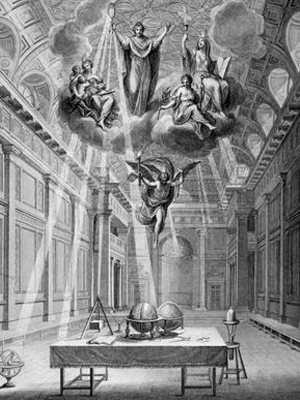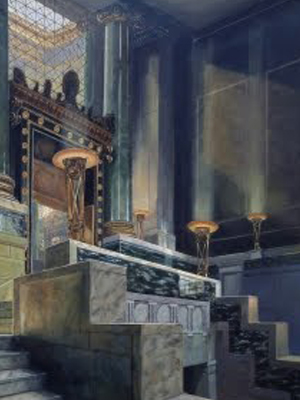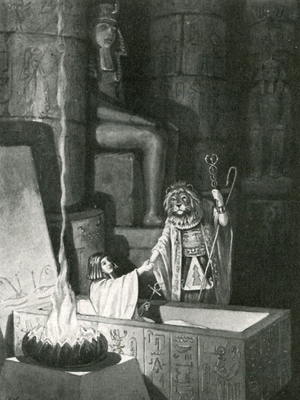Masonic Articles and Essays
Guardians of the Gate
Unknown
Date Published:
2/15/2023
Masonic secrecy is made manifest in the offices of the Guardians of a Lodge, the Inner and Outer Guards. What principles must these officers work to make a reality?
 Any Master Mason speedily discovers that his Masonry is not all “Getting.” It is also a matter of “Giving.” A good Mason must serve, as well as be served.
Any Master Mason speedily discovers that his Masonry is not all “Getting.” It is also a matter of “Giving.” A good Mason must serve, as well as be served.
When Masonry is well served by her brethren, she grows, thrives and prospers. When she is ill served a lodge starves, thins out in quality, gets stagnant and sometimes dies. When your application was received by the lodge, the Master appointed a committee of three brethren, whose duty it was to investigate the truth of the statements you made, to find out what manner of man you are and recommend to the lodge what action it should take. Following their report, a ballot was taken on your application. You were a good man; your committee reported in favor of your application and you were elected. You may not have known of their investigation. In small towns it is not always necessary to see the applicant directly. Generally he is known to one or more of the brethren, and his reputation can easily be established from other sources. In larger centers, one or more members of the committee, in addition to other work, will look up the applicant for a personal interview.
On the accuracy of the report of committees on petitions, and on the fidelity with which they discharge their obligations depends the purity of the lodge and the character of its personnel.
When you are appointed upon an investigation committee you may take it as a signal honor; that your Master has confidence in your good sense, your loyalty and your freedom from prejudices. He believes that you will faithfully discharge the most important Masonic Duty he can give you. Do you, therefore, take the work seriously and do it faithfully?
By all means see the applicant, unless you are completely satisfied from interviews with his friends, enemies, employers and associates as to exactly what kind of a man he is. Some member of the committee must see him or know him, of course; all members should, if possible.
Never be satisfied merely because you find nothing against an applicant. Masonry wants positive not negative virtues. It is not enough that he hasn’t been caught and jailed yet; he must be the kind the law doesn’t want! It is not enough that he have no enemies; he should have friends, and many of them. But it is not necessary a point against a man that he has enemies; it is for you decide whether such enmity is justified by character and actions which would be prejudicial to the lodge were the candidate admitted.
It is not only your right but your duty to inquire strictly into the reasons which lead an applicant to desire Masonry. There are many reasons; most of them good. Those which indicate that the applicant would not make a good Mason will occur at once to anyone. The petitioner who wants membership in order to promote his business is seeking something only for sordid reasons. The man who desires merely to satisfy his curiosity is not worthy of the knowledge he seeks. The applicant who hopes, through influential friends acquired in the lodge, to secure place and power would prostitute for selfish ends the institution he seeks to enter.
Many men will be inarticulate as to why they want to become a Mason. Many others will have many reasons, all combined, you’ll be hardly be able to disentangle one from the other. Be sure that you dig deeply enough to understand the secret springs which move a man, for on the reasons why he wishes to become a member of our great Order will depend, in large measure, the sort of Mason he will be.
Among the “Good” reasons for wishing to be a Mason are; a sincere desire to help others, a respect and veneration for a Fraternity which has been beloved by so many great and good men, a patriotism which would follow in the footsteps of Washington, a love for one’s fellowmen, a desire to be with many friends in activities which they enjoy, a hunger to follow where a father, uncle or blood brother has gone; and a desire to secure the Moral and social welfare of his loved ones.
 But it is not a good reason if a man desires to join a lodge because he believes his family may be in want and he hopes the lodge will help.
But it is not a good reason if a man desires to join a lodge because he believes his family may be in want and he hopes the lodge will help.
The older an applicant, the more closely his reasons should be investigated. A man of sixty who wants to be a Mason must explain why, so anyone can understand! This, because there are men past their three score and ten who hope the Fraternity will put them in one of their homes, or otherwise relieve them of the care of themselves! Such a reason, of course, is wholly unworthy and no such applicant would receive consideration at the hands of any intelligent committee. On the other hand, the older man who has “Waited for his Son” or who “Has only now been able gratify a long ambition,” or who “Has come to believe that only in real Fraternity is there to be found the best in Friendship” . . . these are to be admitted, if all else is well, without regard to advanced age, so long as the statutory requirement is satisfied.
Make your investigation alone, unaided, without reference to the other committeemen. Make your search promptly. It is not fair to the applicant or to the lodge to dilly-dally about it. If you can’t serve, say so. If you do serve, serve well, serve whole-heartedly and promptly.
You will be well paid. A “Master’s Wages” await you when you shall have done your work. Paid not in any metal coin, or anything of material value; but in the finer coin of consciousness of honorable and responsible duty well done, the inner happiness which comes when you may truly say to yourself:
“Masonry has been helped forward by my work,” the knowledge that your lodge is a better lodge because you have paid back, in small measure at least, the interest and the labor your brethren invested in you. The committee on investigation, appointed for the purpose of giving to the lodge first-hand and Masonic knowledge of the character, abilities, attainments and general reputation of applicants for the degrees, is not the only, though it is the most important, committee work a Masons may have to do.
Next to it in importance is the work of the committee sent out from the lodge to examine a visiting brother. Only Masons thoroughly familiar with lodge work should be asked to serve on examination committees, the duty of which is to ascertain if those who would visit your lodge are regular Masons in good standing.
At least two brethren must compose such a committee, and of these, one is usually in charge; the other being merely a witness. There is no law covering this; both may ask questions. Indeed, both must be fully satisfied before the visitor is brought into the lodge.
Usually the first procedure is to examine the documents of the visitor. Formerly many lodges issued Grand Lodge Certificates which were held to be “Prima Facie” evidence that the possessor had been regularly initiated, passed and raised. The possession of such a certificate was held essential, before an examination could be conducted. Now, however, many lodges do not issue such certificates, contending themselves with a receipt for dues or a good standing card, or both. In few jurisdictions is a Mason refused admittance to a lodge because he does not possess a Grand Lodge Certificate. The good standing card, however, is usually considered essential.
It is always wise to ask the visiting brother to sign his name and compare it with the signature written upon the good standing card.Having stateside themselves that the visitor is in good standing in his lodge the committee retires with the visitor to a private room for the examination. You are not to be non-plussed if the visitor here demands to see your credentials, or even to ask to look at the Charter of your lodge. He has the same right to be cautious that you have; the same right to assure himself that this is, indeed, a regular lodge, working under a Charter, as you have to assure yourselves that he is a regular Mason, not an imposter.
 It is required, not only that he take oath to the fact that he is a Mason, and that there is no reason known to him why he should not visit with his brethren, but that you, the committee, take the same oath. And this should give you the keynote to the procedure of examination; it is not an inquisition in which the committee subjects the visitor to inquiry; it is a conference of brethren in which two groups satisfy each other of their mutual brotherhood.
It is required, not only that he take oath to the fact that he is a Mason, and that there is no reason known to him why he should not visit with his brethren, but that you, the committee, take the same oath. And this should give you the keynote to the procedure of examination; it is not an inquisition in which the committee subjects the visitor to inquiry; it is a conference of brethren in which two groups satisfy each other of their mutual brotherhood.
After the tiler’s oath, the committee may ask the visiting brother any question relative to Masonry which occurs to them. He has the same right to ask questions. If both parties exercised their right to the fullest extent, and examination could take all evening! As a general practice, the visitor does not ask questions; presumably he has satisfied himself in other ways that his questioners are Masons and that the lodge he would visit is a regular lodge.
More Masonic Articles
Explore articles and essays written by Freemasons about Freemasonry.
Read More
Membership
Interested in becoming a member of the worlds oldest Fraternal organization?
Read More